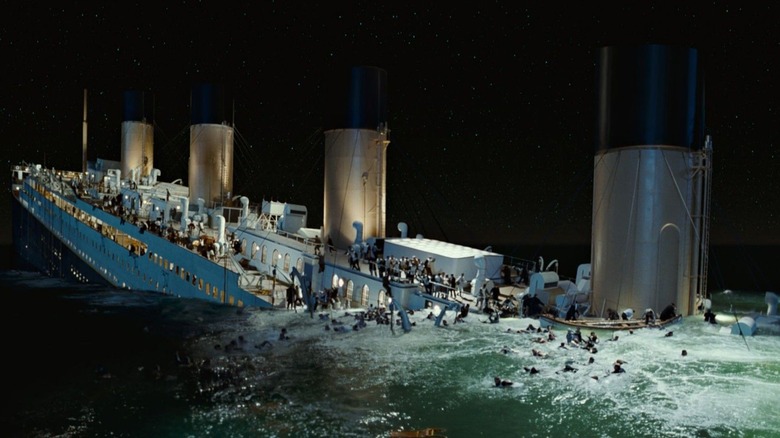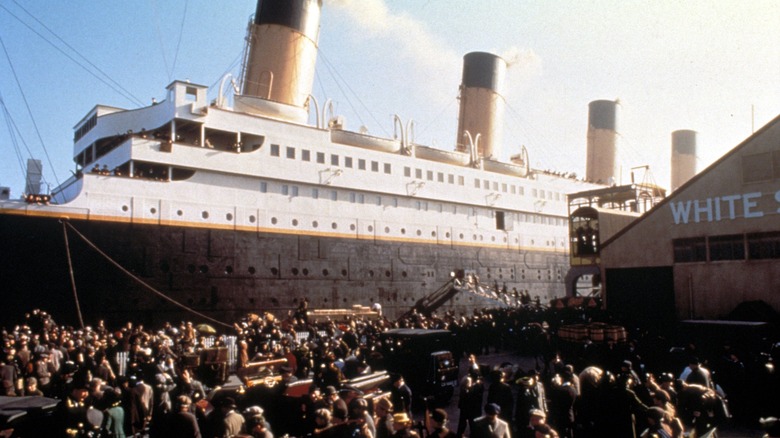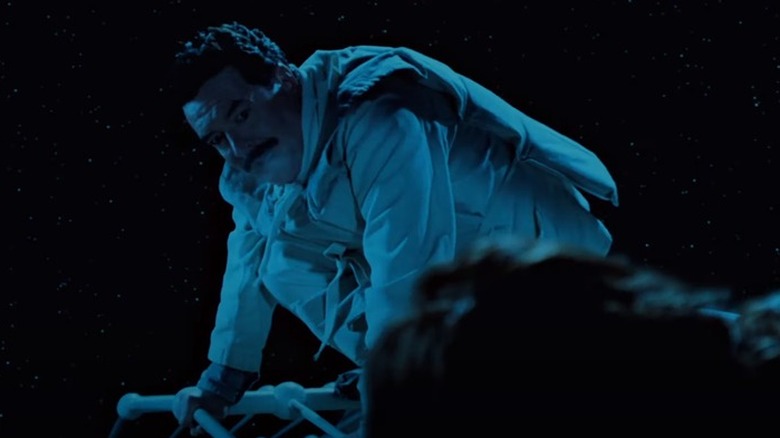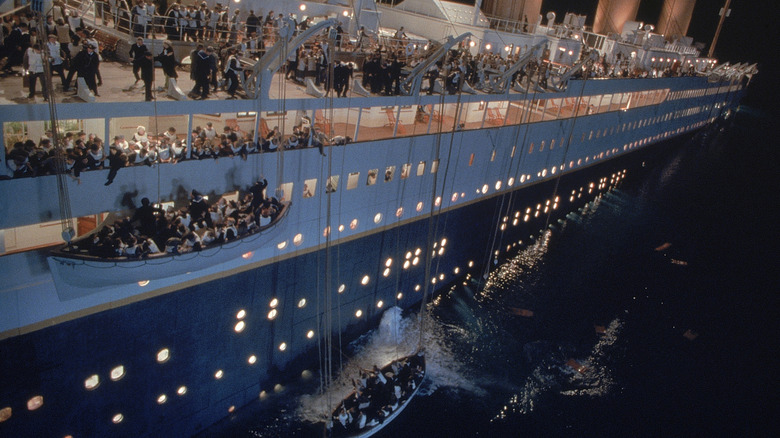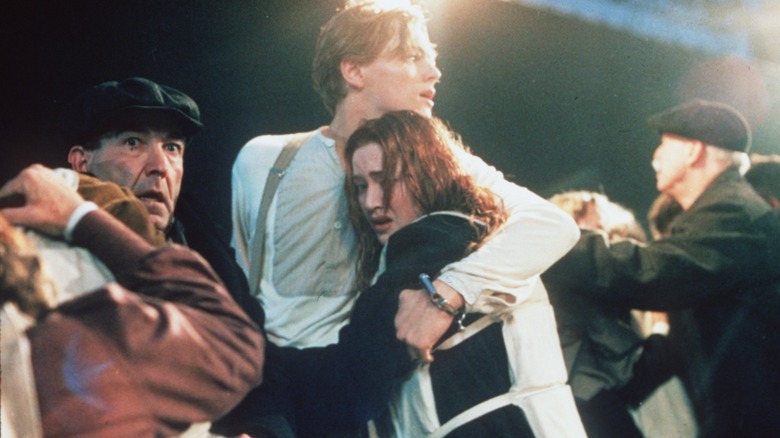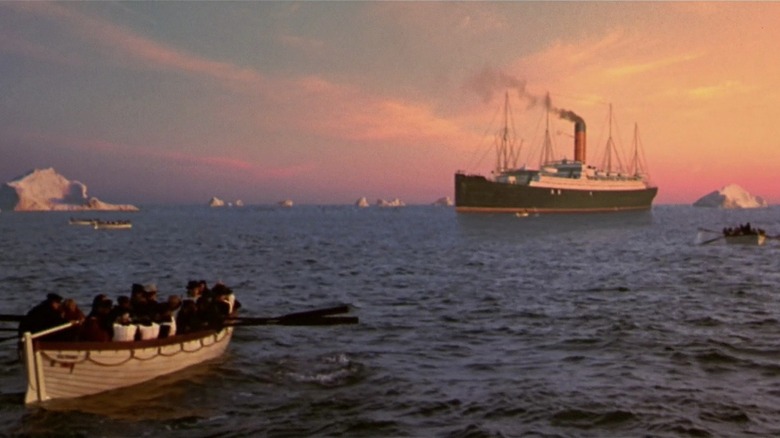The Amazing True Story Of The Chef Who Survived The Sinking Of The Titanic
Remember when James Cameron released one of the world's highest-grossing movies of all time? No, I don't mean the last time he did it. No, not the one before that, either. That's right — I'm talking about 1997's "Titanic," of course, which took no prisoners on its way to dominating the box office during its initial theatrical run. If Twitter and social media at large had existed at the time, it's doubtful that even the biggest skeptics would've cast aspersions on why this of all movies became such a runaway pop culture phenomenon. The selling points, to say the absolute least, are plain to see.
Frankly, the historical circumstances surrounding the RMS Titanic might as well have been tailor-made for the big screen.
The world's largest luxury liner marked the last gasp of high society's freewheeling ways before the First World War and the subsequent Great Depression. There's your class struggle angle. During construction, the magnificent and gaudy scale of the floating structure gave way to breathless public pronouncements that the Titanic was "unsinkable." There's your classic tale of hubris preceding a fall. Oh, and let's not leave out the near-miss collision as the liner pulled out of the harbor on its doomed voyage, described by frightened onlookers as a "bad omen." There's your foreshadowing of impending disaster.
Yet one larger-than-life figure looms larger than the rest. His actions saved untold numbers of lives. His stash of alcohol probably saved his own. And he might very well have been the last person to ever step foot on the vessel as it sank. This is the strange-but-true story of Charles John Joughin, Chief Baker on the Titanic.
Once upon a time on the Titanic...
James Cameron may be the king of turning original stories into cinematic classics, but sometimes fact really is stranger than fiction. Writer and novelist Laura Keating reminded us of this in a recent Twitter thread, expounding on the brief glimpses of the baker that we received in the climactic moments of Cameron's "Titanic." In fact, the drama of his story could very well have fueled an entire movie from his point of view. It's got it all: rags to riches, romance, tragedy, perseverance, and heroism under the most unimaginable circumstances.
The Encyclopedia Titanica details what we've managed to piece together of the early events of Charles Joughin's life. Born to a licensed liquor dealer (Prohibition, history buffs know, wouldn't begin for another few decades) in Cheshire, England on August 3, 1878, the ocean was never far from sight nor mind for Joughin and his younger brothers — two of whom would end up joining England's Royal Navy, with one eventually killed in action and buried at sea. Census records show that young Charles was already serving on various civilian ships as early as age 13, officially described in manifests as a "baker at sea." Who would've ever thought that he of all his four siblings would end up playing the most significant role of them all in saving lives in international waters?
And then, over a decade later, the fateful choice arrived. Before joining the crew of the Titanic, he had previously been serving on its sister ship Olympic (itself the subject of some pretty wild conspiracy theories). A quirk of scheduling allowed him to transfer to the Titanic for its maiden (and final) voyage and the rest is ... well, you're about to find out.
Iceberg ahead!
When the Titanic officially set out from Southampton harbor to New York City on April 10, 1912, Charles Joughin had been aboard and performing his culinary duties for roughly a week. Working as the Chief Baker, he received wages equivalent to almost $2,000 a month in today's currency and enjoyed a fully-staffed crew under him that made up a baker's dozen (fittingly enough). With over 1,300 passengers and almost 900 crew members, that necessitated a small army of cooks, chefs, and bakers to feed all those mouths — many of whom were among the upper echelon of English society, mind you. Nothing but the best for a ship as luxurious as the Titanic, of course.
The honeymoon phase lasted a grand total of five days. On April 15, 1912, the Titanic struck an iceberg in the frigid waters of the North Atlantic, a glancing blow that tore apart the hull along a substantial length of the ship and doomed it to a watery death. (Incredibly enough, an author and descendent of a Titanic survivor claimed that those on duty at the time steered the ship in the wrong direction to avoid the iceberg, exacerbating an already bad situation.)
Our heroic baker, as it turns out, was fast asleep in his quarters when the Titanic made contact with the iceberg close to midnight. Situated amidships (that's fancy sailor talk for the middle of the ship), the collision jolted him awake and sent him scurrying for answers. In the general confusion that followed, he made another fateful choice. Unlike most on board, who had no idea of the extent of their danger, Joughin seemed to have an almost preternatural foreboding that the unsinkable ship was, in fact, inevitably destined to go under.
His instincts would save many lives.
Fact meets fiction
While those in charge failed to grasp what had just happened (or were flat-out in denial), Joughin acted fast. Rousing his underlings, he immediately set to work stocking the precious few lifeboats on board with bread.
As befitting someone of his station, he had been placed in command of lifeboat 10 and promptly assisted in putting women and children on the collapsible boat. As they ran out of passengers willing to jump ship, favoring the perceived safety of the massive (and still floating) Titanic over the tiny dinghy, he and a few other crew went in search of people to save ... and practically dragged them to the lifeboat before literally throwing them on board, as the ship had begun to tilt noticeably at this point and the lowering lifeboat no longer sat flush against the hull.
In between these utterly selfless actions, Joughin apparently stopped by his now-flooding quarters a number of times and quite naturally helped himself to a not-insignificant amount of alcohol. Under the impression that no more lifeboats remained, the forward-thinking baker then began to throw what he guessed to be 50 deck chairs and other floating material into the ocean. You know, just in case!
Here, fiction begins to intersect with reality as the James Cameron film depicts the baker, played by actor Liam Tuohy, in the same company as Leonardo DiCaprio's Jack and Kate Winslet's Rose. It was roughly at this point that he heard what was likely the Titanic breaking clean in half and followed a crowd out onto the stern of the sinking ship. Unlike the movie, however, he reportedly remained the lone individual on the extreme end of the Titanic as it lifted into the air, hung suspended for a moment, and then sank into the ocean.
The secret to success
Hey, at least Jack and Rose had that door. Baker Charles Joughin, armed with nothing more than some hastily-collected provisions in his pockets and his lifejacket, practically stepped right off the foundering Titanic as it sunk beneath the waves and into the Atlantic Ocean, barely even getting his hair wet. (Unlike Jack's frantic warnings to the contrary, it only appears to be apocryphal that the suction of the sinking ship would've actually dragged anyone down with it. Thanks, "Mythbusters"!)
But this is also when the real danger kicked in. Having done what he could to save as many lives as possible, Joughin was left to tread water for up to two teeth-chattering hours while the remaining survivors waited in the hopes that someone had either heard the ship's SOS signals or seen the distress flares that the crew had set off.
So what saved him when most others would have succumbed to hypothermia — and did, tragically — in a matter of minutes? Well, remember those repeat trips to the liquor cabinet, which was also somewhat accurately translated in Cameron's movie? Although it's not all that likely that the warming effects of alcohol actually translate to a higher body temperature, it did at least protect him from succumbing to the effects of the freezing temperatures. Surrounded by scattered lifeboats that were now filled to the brim and others that had been overturned in panic, Charles stubbornly clung to life until another lifeboat stumbled upon him and brought him aboard — where he would later recollect that he felt colder than he had in the actual water. Mind over matter, baby!
The end of the story...?
After the RMS Carpathia answered the Titanic's calls and finally showed up in the early hours of the next morning to rescue the survivors, including a perfectly healthy Charles Joughin, you'd think that this ordeal would've been the last we heard of our brave baker. You'd be wrong.
Upon fully recovering in New York and traveling back to England, Joughin participated in official government inquiries into the sinking a month later. Not only did Joughin reunite with his wife and children, but he promptly began working on the Olympic once more until the outbreak of World War I just two years later. He would then take his baking talents into the naval fleet, serving aboard the SS Congress. Believe it or not, that ship met disaster as well when an onboard fire swiftly consumed the vessel and sank miles from shore. This time, however, Joughin found himself safely in a lifeboat from the start of the evacuation and not a single life was lost.
But as in any epic tale, the highs and lows of life weren't done with him just yet. Tragedy would eventually strike when Joughin lost his wife and unborn child in the birthing bed. Whether out of heartbreak or otherwise, he soon relocated to New Jersey in the early 1920s where he eventually remarried and gained United States citizenship. He served as a baker on dozens of US ships by the end of his life, though not before surviving another potential disaster when he narrowly escaped an accidental ship-to-ship collision that claimed 17 lives.
Having survived numerous shipwrecks, two World Wars, and enough drama to last several lifetimes, Charles Joughin died in December of 1956. But we'll always remember him, as is listed in his death certificate, as "Baker on Titanic."
